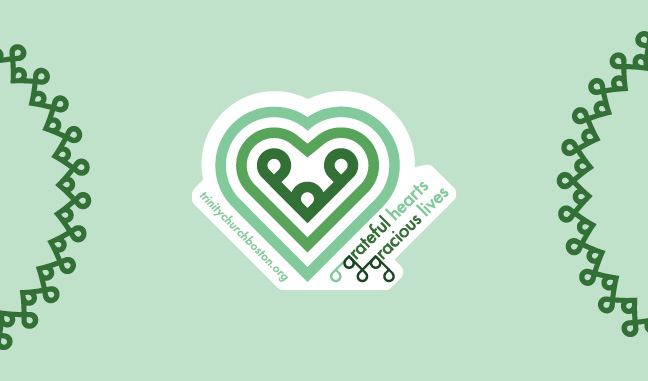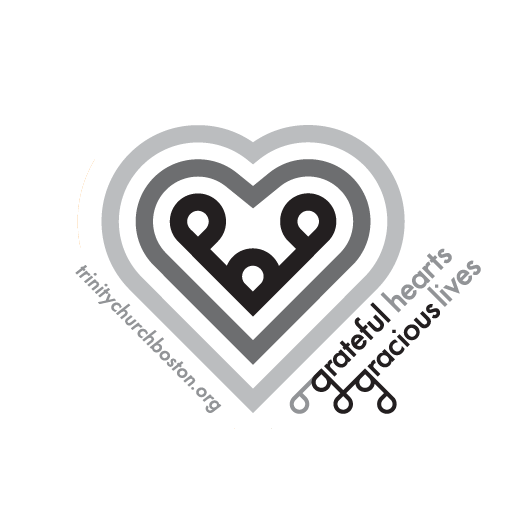Trinity Church in the City of Boston
The Rev. Morgan S. Allen
September 7, 2025
Grateful Hearts, Gracious Lives; Psalm 86
In you, O Lord, have we taken refuge; for the sake of your name, lead us and guide us.1 From Psalm 31. Amen.
Friends, I have carried a hidden assumption: namely, that the immediate needs of most children decline over time. I have set personal expectations and I have assembled elaborate decision-trees based on this unarticulated, untested notion that children – my children – are tracing a smooth, gentle arc of decreasing need: newborn to toddler to adolescent to teenager to twenty-something, until, finally, they achieve independence and don’t much need their parents anymore [Fly, little birdies; fly!]. I confronted this wildly mistaken idea this summer … during what became the most immediately demanding months of my parenthood since my children’s infancy.
As Ginna, our younger, readied for her freshman-year of college, and as Michael, our elder, readied for a semester abroad, my wife, Missy, and I prepared for our lives as “empty-nesters,” our return to a house populated by the two of us and Little Daisy, our dog. Realize that only twice in the last twenty-one-and-a-half years (before thirteen days ago) have Missy and I spent more than three consecutive nights without one of Michael or Ginna right there with us. And know, too, how we have loved that season with our children at home; even for all its legion madnesses, we have loved these years beyond words or dreams – sincerely, beyond what either of us could have asked or imagined.
As the old saw rightly names it, the days were long, but the years were short, and while approaching that wonderful season’s end this summer, Missy and I labored lovingly to push through any weariness we were feeling, aiming to greet every remaining day as precious. We celebrated graduations with gusto, and we hosted family and friends. We made it through doctor visits and dental cleanings, scheduled medical procedures and unscheduled trips to the ER. We drove across the country for valedictory summer-camp sessions, grandparent visits, and a maximally complicated, family-adjacent funeral.
As best we could, we honored the hopes each child wanted to fulfill and the projects each child wanted to complete before they left. We buckled ourselves next to them for the rollercoaster of their emotions and excitements. Along the way, we also managed to play Stranger Things pinball [in anticipation of the final episodes this winter2 We are excited! And this pinball machine is SO COOL.]; to stay up waaaay too late during movie nights3 Scorsese double-features can significantly impact sleep patterns.; and to make more than one happy trip to Crane Beach. We seasoned our adventures with favorite foods: a Sweep-the-Kitchen from Johnny’s Pizza in Shreveport, Louisiana4 Do ask them to run it through the oven twice; all the extra toppings (to include jalapenos and exclude anchovies, obviously) means the crust isn’t quite right the first time through.; breakfast tacos from Mi Madre’s in Austin, Texas5 #s 0, 2, 8, 9 – the machacado may be my sneaky favorite.; and burgers from the Real Deal, right down the road in West Roxbury.6 Kick’n Crunch, looking at you.
And then the storm of activity – which had been utterly consuming and absolutely unrelenting, certainly for these last three months, if not for more than two decades – it ended … and a new season began.
Historically, the Jewish and Christian faithful read many of the Psalms as the spiritual diary of King David, and some bibles will identify today’s appointment as “A Prayer” of Israel’s and Judah’s second sovereign. However, contemporary scholarship receives most such textural references as pseudepigraphal7 As well as other psalms’ attributions to Moses and Solomon, among others. Robert Alter’s The Book of Psalms (2007) offers a translation with rich commentary rich for both study and devotion. and recognizes, instead, the Psalms’ roots in multiple literary traditions and quite disparate cultic theologies across more than a thousand years.
With sundry inspirations, the psalms’ variety presents wildly different images of God: the polytheistic war chants of capricious, jealous titans in one poem, and the lullabies of a compassionate, forgiving caregiver in the next. We Episcopalians include selections from the Psalter in our worship: the daily offices, the Holy Eucharist, and the burial of the dead, all. Indeed, the form of some psalms suggest they were, themselves, liturgical texts, and as a collection, the lauds and laments, prayers and praises, find meaningful purchase in the wide range of our own experiences, from occasions grievous to celebratory.
In the opening couplet of Psalm 86, just before today’s reading begins, the author prays to God: “Bow down your ear, O Lord, and answer me, for I am poor and in misery.”8 Psalm 86:1. Having assessed and acknowledged the difficulty of their situation, the penitent then prays to God for their constancy: “Keep watch over my life, for I am faithful; save your servant who puts his trust in you.”9 86:2. The rhythm of that verse’s center expresses competing energies – both aspiration and petition. Hear both the Yes! of “I am faithful …” and the Help! of “… save your servant.”10 As in our Decalogue responses: Amen. Lord, have mercy.
Those multiple energies continue in the portion of Psalm 86 we prayed today. In verse four, the penitent’s praises of God – “For you, O Lord, are good and forgiving” and “you will answer me” – are, as the kids might say, a lowkey confession and plea; as in, the author sugartalks God’s mercy, because they know they have been less than who God has called them to be. We can even read a hint of weaponized affirmation: “Mumu, no one makes a grilled cheese or takes out Little Daisy as well as you do.”11 Not that we heard this from the sofa in our house this summer …
Likewise, in verse eight, a longer run of praise begins – “Among the gods there is none like you, O Lord, nor anything like your works. All nations you have made will come and worship you, O Lord, and glorify your Name. For you are great; you do wondrous things; and you alone are God.”12 86:8-10. Hear, too, how these exaltations also function as appeals for God to bend the knee of surrounding nations with the intervention of singularly wondrous works.
We Allens are not the only ones starting a new season, of course. With Labor Day passed, summer has begun to yield to fall here in New England. With 17 games to go, down in Foxboro the Patriots remain undefeated! [though, ahem, we can’t say the same for Bill Belichick.] We have backpacks to bless for all those beginning a new academic year – many in new grades, and some at new schools (students, parents, don’t forget to take a backpack tag with you after the blessing!). And today, all of us at Trinity Church begin a new Program Year.

For our parish’s new season, we have chosen a psalmic theme: Grateful Hearts, Gracious Lives – psalmic both in content and in form. In content, we resonate with Psalm 86’s final pair of verses: “I will thank you, O Lord my God, with all my heart”13 86:12. … see, that’s the gratitude; and “For you, O Lord, are gracious”14 86:15. … and that’s the grace.
And psalmic in its form: yes, the alliterative and syllabic poetry, yet also in Grateful Hearts, Gracious Lives’ presentation of tussling energies; as in the psalms, that phrase expresses both praise and petition. In this way, our theme becomes a prayer – a prayer for ourselves and for the whole world, binding what is to what might be.
See, if we set personal expectations and built decision trees based upon the unarticulated assumption that the common good, a mutually agreed set of basic civic and community values [… you know: kindness, trustworthiness, generosity, peaceableness … that those values] would require less immediate attention over time, having traced a smooth and gentle arc toward consensus, surely this worrisome American season calls into immediate question that mistaken notion. Even if we have centered those values for years, for decades – for our whole lives long! – this new season of global life demands we labor lovingly through our weariness of national dramas and renew our commitments to the Christian way. Indeed, every day remains precious, and this moment calls us to Grateful Hearts and Gracious Lives.
We live that theme – our prayer – as both accomplishment and as aspiration, a mode of fake-it-until-we-make-it. By this, I do not mean that we act falsely – of course not. Rather, we lean into an identity deeper and more essential than what feels most comfortable or seems most readily at our nearest hand. We lean into the very graciousness of God, the God who has given us all that we have and all that we are … the God who has provided beauties and wonders beyond words or dreams – sincerely, beyond what any of us could have asked or imagined … the God who has declared those blessings good and who has called us to become a blessing to the whole world.
We lean into that, the essence of our being, and we endeavor gratitude – even when thankfulness may well not be the first energy we feel. I mean, a lot of these utterly consuming, absolutely unrelenting news cycles are making it clear that things ain’t always gonna be Stranger Things pinball and sunny afternoons at Crane Beach.15 Even though those are super dang fun, and we better make time for them. Trinitarians, sometimes we must pitch a picnic in a rainstorm!16 … what today’s weather demanded of our Program-Year launching picnic. We must deliberately search for God’s grace; give thanks for those blessings; and then align our lives accordingly.
Thanks be to God, we do not undertake this righteous prayer alone! We bind what is to what might be, and we seek Grateful Hearts and Gracious Lives in our Trinity Church community. Sunday by Sunday, we gather as a parish family to practice our thanks and praise, to share with one another the gracious plenty God has shared with us. Peering into this new Program Year we look forward to singing together, to learning together, to serving together … to challenging the world’s depravity with the joys of our companionship and the generosity of our spirits, together.
And, of course, we should season these adventures: that Dunk on our ride into Copley Square, the [chef’s kiss] bacon-and-egg of our monthly breakfasts, and certainly this morning’s Blue Ribbon barbeque and Nigerian Fellowship fare – I mean, if you have other plans for lunch, you need to swap ‘em! Even the most wearied among us can find room for thanksgiving with plates that delighting!
So let’s get to it, Team Trinity! Get your face painted and fashion a balloon animal; play a goofy game with a new friend and share some lemonade with another – that we would share in grateful hearts and gracious lives, on this morning and for all our days.
Amen.
